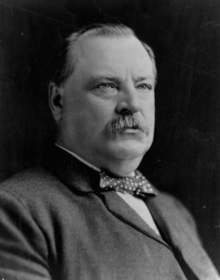Search This Blog
Sunday, April 15, 2012
Grover Cleveland
Served as President from 1885-1889
Era: Gilded Age
American Identity and Culture
Grover Cleveland reflected some of the feelings at the time in that he opposed temperance. This won him the support of the thousands of Irish, German, and East European immigrants who migrated to the United States in the 1880s. The temperance movement had previously attracted the attention of urban reformers. Women were especially convinced that male factory workers who drank alcohol excessively were the main cause of poverty for immigrant and working-class families.
Economic Transformations and Globalization
Once he took office, Cleveland pushed for the repeal of the Bland-Allison Silver Purchase Act of 1878 and tariff reduction. He advocated hard currency and therefore believed that paper money should be backed by gold. As a result, he wanted to inflate the money supply by purchasing and coining silver to reduce people’s confidence in the American dollar. He would be punishing creditors by paying them money less valuable then the money they had originally loaned. Tariff reduction was supported by many Democrats. Unfortunately, Cleveland’s ineffective leadership failed to bring a significant change. However, Cleveland succeeded in signing the Interstate commerce Act of 1887 which was the federal government’s first attempt to regulate business.
Environment
Railroads continued to expand during Cleveland’s presidency. It connected the country in that major cities could trade with each other, even if they were on opposite sides of the country. Cities provided both a supply of labor for factories and a target market for factory-made goods. Population soon shifted from rural to urban as more Americans moved to towns or cities, leaving farming for industrial and commercial jobs. Americans hoped to find new economic opportunities within the cities. Cleveland’s administration also retrieved about 81 million acres of government land from cattle ranchers and the railroads.
Politics and Citizenship
In the election of 1884, Grover Cleveland was supported by the reform-minded Mugwumps as the Democratic nominee. The Republicans decided to play on the fact that Cleveland may have fathered an illegitimate child and practiced a dirty election campaign. The Democrats were labeled as the party of “Rum, Romanism, and Rebellion.” As president, Grover Cleveland practiced a frugal and limited government. He implemented a new civil service system set up by the Pendleton Act of 1881, which selected applicants for classified federal jobs based on their scores from a competitive examination. Not only that, Cleveland also vetoed many private pension bills to Civil War veterans who submitted false claims to having been injured in the Civil War.
Slavery and its legacies in North America
On the delicate issue of race, Cleveland was inconsistent. He spoke out against the treatment of the Chinese in the West, but sympathized with Southerners on their reluctance to treat African Americans as equals both socially and politically. Cleveland even made special efforts to reach out to Democrats and former Southern Confederates to assure them that he was a friend to their beliefs. He also opposed the integration of schools and saw African Americans as an inferior group of people. By refusing to provide government support to what he regarded as a social problem, he failed to protect the suffrage of African Americans. Cleveland also thought that Native Americans should take advantage of the federal aid for education and private land grants by assimilating into white society. He signed the Dawes Severalty Act of 1887 which broke up tribal organizations and divided up the land, promising U.S. citizenship to those who stayed on the land for 25 years and “adopted the habits of civilized life.”
War and Diplomacy
Grover Cleveland handled foreign affairs delicately. He found himself caught in between a complex issue on American fishing rights in the North Atlantic off Canada and Newfoundland, but prevented conflict from arising. He also dealt with the issue on the disputed boundary between Alaska and British Columbia and the decline of the fur seal population in the Bering Sea. However, the issue in Samoa was different. Due to the fact that the United States had treaty rights to establish a naval base there, Cleveland lashed out when Germany attempted to set up a puppet monarch. Cleveland responded by sending three warships to the island, a belligerent action that eventually led to a protectorate over it by German, Britain, and the United States.
Subscribe to:
Post Comments (Atom)

No comments:
Post a Comment